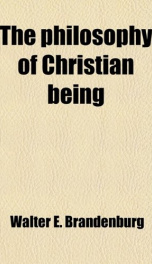the philosophy of christian being

Purchase of this book includes free trial access to www.million-books.com where you can read more than a million books for free. This is an OCR edition with typos. Excerpt from book: Ill THE NATURALNESS OF THE RESURRECTION " Verily, verily, I say unto you, Except a grain of wheat fall into the earth and die, it abideth by itself alone." 1 Immediately preceding these words of Jesus is this statement, " The hour is come, that the Son of man should be glorified." 2 Following the text is the statement, " Now is my soul troubled; and what shall I say ? Father, save me from this hour." 3 Thus, getting the line of thought, we see that Jesus is here speaking of his death upon the cross, and of the results that will follow out to humanity and to the world because of that event. The death of Jesus and his resurrection are the two great facts in this text. These facts are here presented in the imagery of the deepest and most fundamental law of all existence: the law of sowing and reaping. I wonder if we have deeply and seriously thought how meaningful this law is when applied to the things of the kingdom, or more particularly, when applied to the death and resurrection of Jesus? Uohn 12:24. 2 Ibid., 12:23. s Ibid., 12:27. I would direct your thought into a study of the Naturalness of the Resurrection. I am not unmindful that the very wording of my subject seems to be paradoxical in statement. In the very beginning of Jesus' ministry, he placed the fact of his divinity upon the reality of his actual bodily resurrection from the dead, when he said, " Destroy this temple, and in three days I will raise it up."4 At the close of his ministry, he placed the condition of establishing his church on the earth upon the fact of his divinity, when he said, " Upon this rock, (the truth that he is the Christ) I will build my church."5 Thus, the church rests upon the fact of his divine sonship. And his divine sonship rests, humanly speaking, upon the reality of his ...
Info about the book
Author:
Series:
Unknown
ASIN:
079146492X
Rating:
5/5 (5)Your rating:
0/5
Languge:
English
Users who have this book
Users who want this book
What readers are saying
What do you think? Write your own comment on this book!
write a commentif you like the philosophy of christian being try:
Other books by this author
Do you want to exchange books? It’s EASY!
Get registered and find other users who want to give their favourite books to good hands!

